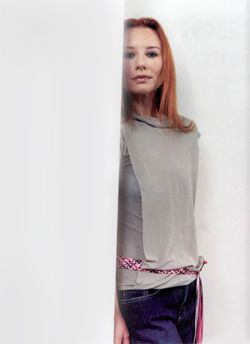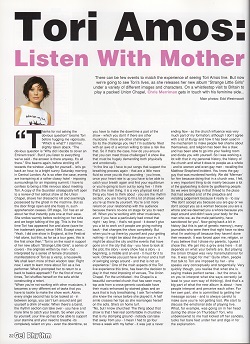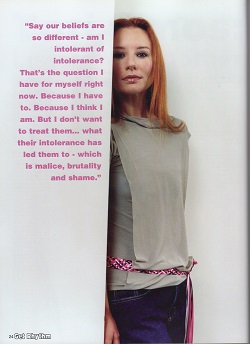|

songs | interviews | photos | tours | boots | press releases | timeline
Get Rhythm (UK)
October 2001

Tori Amos
Listen With Mother
by Chris Merriman
Photos by Edd Westmacott
"Thanks for not asking the obvious question!" beams Tori before hugging me vigorously. "Which is what?" I stammer, slightly taken aback. "The obvious question is, 'Why did I decide to cover an Eminem track'. But if you listen to everything we've said - the answer is there anyway. It's all there." She beams again, before strolling off towards the window. Judge for yourself... let's go back an hour, to a bright sunny Saturday morning in Central London. As is so often the case, events are transpiring at a rather classy hotel - imposing surroundings for an imposing summit. I have to confess to being a little nervous about meeting Tori. A copy of the Guardian strategically left open to a review of her sellout show at the Union Chapel shows her dressed to kill and seemingly possessed by the ghost in the machine. But as the door flings open and she floats in, such apprehension ceases. Off stage, Tori has an air about her that instantly puts one at their ease. She smiles warmly before reclining on her sofa and we begin talking of the gig.

Touring Solo
This is the first time Tori has appeared live and alone (save for her trademark piano) since 1994. Except once... "Yeah, I did one show in England, at the Festival Hall alone, but this, as far as a tour goes, this is the first since then." Tori is on the road in support of her new album "Strange Little Girls", a series of covers - the originals written by men - but interpreted by a series of female characters -manifestations of Tori as a vamp, a housewife. We shall learn more of their wisdom later. Right now, I want to learn more about Tori as a live performer. What's prompted her to return to a back to basics approach? For the first of many times, Tori shuffles herself on the sofa whilst constructing a retort.
"When you're not working with other musicians, it becomes a very different set of tasks that you have to tackle to make the show work. Alone, every single second has to be looked at - in between songs, you can't turn around and get yourself a drink of water. When there's a band, the rhythm section can take over - you have a lot more time to catch your breath. So when you're by yourself, your line-up has to be able to support your stamina and your need to breathe - it's completely reliant on you - even the downtime, so you have to make the downtime a part of the show - which you don't if there are other musicians - there are other challenges". So its the challenge you like? I'm suddenly filled with an awe of a woman willing to take a risk like that. So if that's the case, how do you ensure that you can meet those challenges? A show like that must be hugely demanding both physically and emotionally.
"In the line up I have to put songs that support the breathing process again - that are a little more fluid so once you do that pounding - you know, once your heart rate is up you have to be able to catch your breath again and find your equilibrium or you're going to burn out by song five - I think that's the main thing, it is a very physical kind of thing you have to think about - you are the rhythm section, you are having to fill a lot of shoes when you're up there by yourself. You're a lot more reliant on your relationship with the audience because there's no-one on stage for you to react off. When you're working with other musicians, even if you have a particularly bad crowd that night - say limp, - that's not good - it doesn't give you a lot to work on if people are giving nothing back - that changes the show completely. But when you're up there by yourself and your getting nothing - it might be about the place your in, it might be about the city and the events that have gone on in the city that day - you have to look at the plot, the story - every show has a story - a beginning, a middle and an end - it must for it to work. Otherwise you just have an hour and a half of swinging songs around - and that is not an experience."

The Union Chapel
One of the main aspects of the Tori live experience this time, has been the decision to play in that most imposing of venues, The Union Chapel. For the uninitiated - the Chapel is a beautiful converted church that has seen many top acts from a cross-generic cavalcade have their music enhanced by stained glass and an aura that is truly breathtaking. I ask Tori whether she knew the venue before she played it. A half smile crosses her lips as she rearranges herself on the sofa. She's on home turf.
"No, but I know churches! The thing about that show is that I feel real comfortable in churches that is my stomping ground - nobody can take that away from you - I mean I had to go four times a week with my father - it was just a never ending flow - so the church influence was very much part of my formation; although I don't agree with a lot of liturgy and how it has been used in the mechanism to make people feel shame about themselves, and religion has been like a claw, and has been able to go into your feeling room and divide you with yourself. So I was working a lot with that in my personal history, the history of the church and what it does to people as a whole and to women and even gay men - recalling the Matthew Shepherd incident. You know the gay guy that was murdered horribly. We did 'Merman' for him because doing that in a church was, I felt, a very important thing to do mainly because a lot of the gaybashing is done by godfearing people. So we were bringing in that thread to the place that had seeded a lot of the prejudice and violating judgement because it really is - to say "We don't accept you because you are gay or we don't accept you as a woman because you are a whore and we deemed you a whore because you slept around and didn't save your body for the man who we, as the male patriarchy, have sanctioned for you". Now going back a bit in history (but this is part of genetic memory), many journalists who were there that night have no idea what I'm working off because they haven't done their research. It was forced upon me, religion, or if you believe that I chose my parents, I guess I chose this. We get into a grey area here - it all depends on what your beliefs are. But playing the Union Chapel was very transmutational for me. It was magic for me!" Quite often, people that talk to Tori are imposed by her - she speaks very conceptually and tangentially. Very quickly though, you realize that what she is saying makes perfect sense - but the onus is on you to interpret what she says correctly (at least to your own way of thinking). And that's a big part of what the new album is about - how people interpret and perceive each other. For her own part, she is committed to getting her message across - and is always careful to make sure you're not getting lost.

Emotions & Satin
We start to discuss the emotional side of playing live. What, for example, was going on in her head during the show on Thursday? Tori, who unbeknownst to me had kicked off her sandals, tucks her bare feet under her and digs in for the explanation.
"Liberation for hundreds and hundreds of years -when I came out and did 'Raining Blood' - there were two things, one of which I wasn't aware of at the time, but I was very aware the sacredness of the reclaiming of the woman's blood which has been reviled for hundreds of years, in certain tribes it has been held sacred as what it is - it's healing blood, you don't bleed from a wound. And people have made this a real dirty kind of thing, and even women sometimes talk about the grossness of it instead of just respecting it for what it is - as I say there are tribes who do respect it and have taken it to another place. I'm not suggesting that you do that - you know, save your menstrual blood and do X, Y and Z with it but there is a simple rational ground you can walk with it where it doesn't have to be this dirty, gross act that happens to women - that this is some kind of punishment. Which has been the conscious or unconscious message - so when I walked into a church, I was going to tackle that -and when you go for bodily function, you go for something that tastes, smells, that you can touch - its a tangible thing - and doing Slayer in God's house I thought was correct because I didn't find Satan - I found satin in it all." The aforementioned Slayer track is a perfect example of the new album's premise - of course 'Raining Blood' wasn't written about menstruation, but that is how Tori's character perceives it. This is something else for us to explore later, but I forgot... there was another thing...
"And so the other thing that was going on at the time is that there is a piece of rock right before we came out, there is an entry point into the womb of the church - there is a rock at the door Plymouth Rock and it said something along the lines of "Something that is ready for Prayer" and the blood that was shed, the aboriginal American blood, the native American blood that was shed by these puritanical godfearing people - it was savagery and yet they call the Indians the savages. It's exactly what the Nazis did to the Jews. And the Americans cannot own this one and they cannot own that this land was claimed very brutally and it was systematic - they were just going to get as much land as they could and the agreements that they made? They just made sure they got rid of those agreements so its really dishonorable how that land was claimed and until we can admit it, there is a huge shadow stalking America. Of course it's a violent place - it was claimed violently - and because we can't admit it, we're turning on each other! - This is very basic stuff." Yes, but Tori, right or wrong, this is the premise that has happened to a lot of countries - why pick on America as your example?
Remember there was the small matter of World War 2? "But then the Germans have had their feet held to the tire by all of us - "You bad Germans" and what did they do that is so different to what the Americans did to the Indians? If you look - if you go look - it took longer that a few years, but the systematic disposal of the braves to make sure - you know, if you call all the men, its over. The old medicine woman knew about it and talked about it, and they saw, and I wish you could speak to some of the women that have that kind of wisdom, that really do understand what happens. If you talk with some of them, they're not bitter, but they do understand that the only way to not eat yourself is that you have to acknowledge how you've attained what you've attained - and then you're free!" It sounds to me like a lot of what you're about at the moment is the breaking of conditioning, to unlearn the learnt? "I feel like I'm walking into that right now in my life - that's what I'm trying to strip away, and in that finding, what is my identity as a being, and what is my works identity, and the culture's identity." So was there something, an event in your life that has set you off down that road? This time, no shuffling, no pause for thought, the word is emphatic.

Mother & Y Kant Tori Read
"I feel like being a mother has affected me in ways that I had no idea. I mean the egg cracked and out came many things besides Natashya. All of a sudden it just became okay. I'm not a young girl anymore and I don't want to be, but the young girls, we love them. I have a niece who is a young woman, she's just turning 16, and that time and that stage in the twenties is such an adventurous time. And the endorphin that has the capacity to reach certain things at that age. There are certain things that you can do at that age that you can never do again so embrace it - love it. But then there are also certain things that you can't do until you are a little older. I don't think women getting older has been valuable up to now, there has always been this worship of youth - especially with women - because men can do this whole Sean Connery thing. Men just start hitting their stride at forty, so we women have to be very clear - I don't want to be in my twenties again! I did what I wanted to do then - it was very adventurous time - don't regret any of it - not even 'Y Kant Tori Read' - how great to be a rock-chick in the eighties - when it was time to be a rock chick - know what I mean? I've been to Retail Slut and did the shopping - it was great! But no I think, you look at the world and look at your beliefs and are you willing to stand by them -even if that makes you not the most popular gal in the room. At least to try and get along with people - even if you don't like 'em. Say our beliefs are so different - am I intolerant of intolerance? That's the question I have for myself right now. Because I have to. Because I think I am. But I don't want to treat them... taking them where their intolerance has led them to - which is malice, brutality and shame. I try to pick up that gauntlet and address it and I use the power of words - some of which are very liberated and open minded, and some which aren't... open minded to different sexuality's, different sexes, different ways, if you know what I mean."
For the uninitiated, "Y Kant Tori Read" was Tori's first band, a first outing by the girl who, a few months earlier had been Myra Ellen - preacher's daughter, half Cherokee Indian.
Intolerance of Intolerance
By now my head is spinning, I keep mulling over the concept of the intolerance of intolerance. Surely the greatest paradox of our age? How do you get out of a vicious circle like that? And it is a vicious circle, isn't it?
"It is - on the one hand, but on the other, I think its about recognizing how you become an effective activist against intolerance because if somebody wants to be in their space and hit themselves 40 times over the head - I'm not going to stop that - if they want water and I'm passing by then I'll give them my water. But if they want to do that to my daughter, because they've decided that their religion has decided that this is how we treat a woman who wants an education and the women are crying - the women are dying. Yet a lot of them believe in it - some of these young women are being tormented because they want to choose a different path from that which their religious parents want them to choose. You just have to pull back a minute and go 'okay, that would be intolerant - when you take it to another person's life and force it on them' - non agreeing parties we're talking about, so how do these people have faith and space? Because they might be murdered in trying to gain that liberation, and it's very, very different when you're dealing with such rigidity. I'm a liberal kind of person, I believe that we should all be able to choose our beliefs as long as we don't try to subject another person to them, that doesn't want to be subjected. So how do we shake that tree? How do we get through? Sometimes just to be able to get in the door where that discussion is happening you have to get the invitation to get in or the bodyguards keep you out. So sometimes you must find ways to infiltrate. Using the man's word was a way of getting access. Because it's the man's word - the seed - and you plant it in the womb of the woman's voice - so this project is the woman's voice's perception of the man's seed - the consummation of it - So there is a Y chromosome involved."
Strange Little Girls
She pauses and takes a sip of water. She has broached for the first time the premise behind the album. 'Strange Little Girls' is clearly a labour of love extending beyond a mere covers album. Each song features Tori is a different guise - the accompanying artwork showing photos of each woman - each with their own story, and a visual interpretation aided and abetted by renowned graphic artist Neil Gaiman. This is the story of 13 women (12 songs - one set of twins) bringing their own hypothetical life experiences to a range of songs spanning the past 3 and a half decades - and all originally written not by Tori or other women, but by men. It occurs though that, as a renowned singer-songwriter, to take away the writing part of the process has the potential to diminish the overall effect of a Tori Amos album. There's a touch of devil advocating anyway, but Tori has something to say to Lucifer if he's listening: "Let's just say I couldn't have done the project if I hadn't have been a songwriter. If you're not an architect, you can't take another architect's blueprints and translate it - you don't know the language. So I had to be able to know sonic geometry on some level to be able to walk into their different soundscapes and make sense of it all, and then bring it to my instrument and let's face it - my thesis. It has to work within a certain corner of the project.
"It had to resonate with our time now in some way." And of course it's true - whilst covers have traditionally been seen as a poor cousin, or a bit of fun for the fans, this is taking them on to a whole new level - changing the agenda from conception, to perception. But to devise a project like this, where there are hundreds of thousands of songs to choose from must have been daunting, to say the least.
Men Laboratory & Time
How did Tori go about selecting the songs?
"I had a control group of men, I call them the laboratory men and they were very much a resource for me (not just kind of just swinging my opinions all over this). I really did some research on this again for my thesis to work - which is how men say things and what a woman hears. I had to know how women say things and what a man hears and sometimes it's true. What a man hears is in a similar galaxy. We saw very different pictures of it and I was very influenced by a couple of the men and how the songs affected them - so there's many layers to this - not just the songwriters and their versions, but there's the men that brought the songs and their stories and their opinions of us. Sometimes I just, and sometimes I disagree virulently with them Sometimes I sat back and said, "Okay, I see how they're affected," but then I'd see the female character. The Tom Waits song defines it the best. The man who wrote it had just experienced a death in his life - somebody close to him had died, but for the female character - then death walked in and the idea of death singing 'Time' became a very different song to just a woman singing 'Time' - forget herself. Time never runs out - but it has for those that she's come for ‚ and when I saw her just sat in the room and I saw what this man had been going through - the grieving and the loss of his friend, I just sat in a corner for a while and just watched: The essence of death is very neutral and yet compassionate but there was no pity in it. When it's time it's time. And at one point her essence just looked over at me and said, "Tori, it's time for you to love. It's not time for you quite yet. Today. But it's time to love. And then we go into the definition of love and y'know love can come from a place, not gushiness - not this forced smile. As I've said to people before, if someone's smiling way too much, they're ready to crack, or throw a butterknife at you... or do a Colgate commercial. So the whole idea of What is Compassion? Sometimes it's not doing that for the person that has asked you to do something for them. You look at them and you say, "Y'know what - you're capable". I've done this for you this time, this time and this time and death looked at me and said, "Tori - Capable." Don't be afraid to walk with me in life. It's not depressing to walk with death. For me it's been a very important awareness. So do you see what I mean? It's not being afraid of some of these archetypes that have traditionally been The Grim Reaper, (y'know - skin eaten away and stuff), I found that very kinda beautiful." And there's not really an awful lot you can say to that.
Making the Characters
Painting characters this vividly is the other prong of the project. Each song has to be reinterpreted by one of "Tori's Women" or perhaps it should be that each woman had to have a song chosen for her? "It's a chicken and egg thing. Is that fair to say? It's not that black and white because sometimes the songs and the characters came together, and then sometimes they started to get a back story develop - and then I'd be calling a whole other team - the visual side. Then we would start developing what we knew of the woman how to bring her into physical matter. So we had a few teams going - we had the control group that was offering up songs that meant something in their lives; and then we had the musicians and the sonic group that were trying to interpret the songs and put it down, then you had the visual group that were trying to decipher all the dreams and messages and whispers that I was compiling so that we could thicken the visual theme."
Neil's Impressions & Adopted Song Children
Then of course there are Neil Gaiman's impressions because he said to me at one point - he was part of my control group - "Don't you think that for a woman to do these impressions of the men on the men, that a man needs to do a woman's impressions of the impressions?" So I said, "Yes, Neil". She rolls her eyes and shudders in mock giddiness. Neil Gaiman has cropped up repeatedly during the discussion, and is seen as something of a Iinchpin to the project. Gaiman is probably best known for the 'Sandman' series of graphic novels, or possibly 'Neverwhere', the six-part fantasy drama set on London's abandoned stretches of Underground.
She speaks of him with fondness as we again broach the question of concept - what is Tori's relationship with the songs? With the characters?
"The Conversation and the questions that are coming up, and the way that they are coming up could not have happened - and Neil and I have spent hours and hours on it. There's no commentary. When I'm just offering up my own song, you can't see the process, there is no back story for you to go to. There are other points of view on this that already exist - there's no alternate viewpoint. That's where the tension of the opposites comes from. There's no tension because you figured it already - y'know, its coming from me and I've resolved it all within. It's my statement. It's like bringing up your own children, as apposed to bringing up foster children - its a very different thing. They don't have your DNA. I've spoken with people who are teachers and often have long relationships with kids - and they care about them and love them - especially in some Montessori schools where they're able to have them year after year after year after year. You think about the relationship that they still have - they're carers. But they're not their own. There's no shared DNA, but they are close with them. The secrets that are told and the conversations that are had, students might not even have with their parents. But part of their development is in the relationship they've had with someone where there's no genetic link-up but it is about discourse, it is about, "Wow, I see the world differently because I've had a relationship with this person," and that's kind of what we're talking about."
So are you saying then, that each experience of a song is a new relationship? "No, not at all", she screws up her face in disgust, "But I can certainly appreciate what they're doing. Sometimes I just hear that in bar 7, they're doing this or that - they're doing a suspension here or whatever it is - you can watch the notes playing in your head but you're on the outside of it. But that - that's like saying, 'Do I undress every man that walks in the room?' Of course not! 'Do I crawl into his soul or his psyche?' No. He has his edges, and I have my edges, and we don't build the bridges and crawl into each other's worlds - we're exchanging thoughts - kinda like sending messages back and forth on a computer. It's not like they can go into your mailbox and start excavating. I use this word a lot, but in the songs you hear. Suddenly you find yourself in some of the rooms, and you go into their closet and go, 'Oops, I don't know if I'm invading here.' Sometimes you're given an invitation on some levels to invade. Then we get into a grey area again. This is only something that you can work out with the songs themselves."
So is that to say that your relationship with the songs is removed? Like you were mentioning with eachers and foster-carers?
"There were two levels with this. There were the song mothers - who were the men and then there are the song daughters - my song children is what I call them.
"They may not even think of them in those terms, but I do. I think of my own songs as the girls, but these were strange girls - not my girls. However, I had a relationship with their song daughters. Not with the mothers. But I respect that relationship, and that remains intact on all their own work somewhere - because that's what their relationship is - its indelible - it lives."
Perception & the Power of Words
And again, we return to the problem of perception - which is the focal point of the album. People's perception of songs is unique, but surely Tori, you've gone in to the studio with hopes for what listeners will be able to take away with them? What would you hope that someone listening to 'Strange Little Girls' would gleen from it?
"The awareness of how someone hears what you say, you cannot control that, and you can't even imagine it - so it's the awareness of the power of words, and sounds, if misunderstandings occur, there is a reason for it. When you say something to someone and they repeat it, you have no idea what that word meant to them - perhaps that someone has used it in a relationship before, that terrorises them. Every word has a family tree to it, so when you are having a conversation with a person - you really have no idea of the richness that is going on within them - the level of how they're hearing. Then on the other side of it, as a listener, how we choose to hear - are we really listening to what someone says? Are we then able to interpret it in our own way and then pass the message on to someone else in a way that maybe they would understand it. So it's a record about communication and integration, not segregation." But that's a mindboggling concept! So potentially every conversation you have is a ticking timebomb! My head hurts, Tori!
"You can get overwhelmed by that tree though can't you? Worlds are created when you're having this conversation - instead of this people have... 'Awww, we just had a chat'. We can travel galaxies just with thought, and what thought holds. People say there's nothing faster than the speed of light. Oh yeah? There's the speed of thought. I can think that I'm... two galaxies over, and I am. That's quicker than light I would think. How thoughts can infiltrate somebody else. And let's be honest, that's really what our time is about. The old adage 'Divide and Conquer' is still being done through advertising. There's no blood on the floor. And yet we get dragged in - maybe forgetting our own feelings and beliefs even in the process."
Real Men & I'm Not In Love
We're finally getting to the point. This isn't about juxtaposing gender roles at all - its about perception - how people perceive words and what those words are capable of. So is this a new fight or a continuation of the old one?
"I've been at war with the patriarchy for a long, long time and even the women that are in the patriarchy - it's not always the men. There a lot of men that I know really well, these are the Eagle Men, the men full of great thought and sages, that I'm lucky to be surrounded by. It wasn't being effective any more. It was for a time. We go back to Martin Luther and the 17th century as being nailed to the door of the church. There has to be a place. When I was seeing some of this Jesse Helms philosophy - a north Carolian politician whose in his late seventies now and who has been a real force in American politics. Some of his philosophy, either knowingly or unknowingly has been taken on board by some of these really groovy tattoo, pierced, sexy... erm... walking plasma. You have to sit back and say there is an anti freedom movement afoot that has become quite glamourised right now. And you end up with women who say, 'Look, it's my freedom to give away if I want.' And you just have to say, 'Wow, the inquisitions gotten very clever.' They don't need to torment anybody. You've got people over in Turkey or Afghanistan saying, 'Don't you dare take away my freedom to be defecated upon.' I look at the men around me saying, 'What are you girls doing? Why?' You've got a whole contingent of men, particularly hetrosexual men, and you have to ask what are these men doing hating women? Then what are you women doing wanting men that hate you to love you to see you? So there is always a question of Real Men and as women, how do we define that? What is a powerful man? We go after that in 'I'm Not In Love' by showing you this power game that she and he are at. It's a very involved little sexual dance, a tango happening. And it can be fun for a while. And then not. Because, what is power? You start to give away slices at a time, till you turn around and see that the pie has been cut up and you were part of the cutting. So what is our part in it? You and me in a relationship? What is my part in it? Not always them, them, them. So the idea that men can crawl over and into the skin of the women and see how they heard what the men said. I chose to this way in this circumstance, if I did it again I could look at it completely differently, its endless. And then the men could take it from the women. That's why Neil Gaiman's impressions were very important because I don't always see the women as he does - but that's his right. He knew the back story, he knew the women. We talked for hours and hours, ad infinitum. To me there was just an exchange, not just a taking, there was also a gift of a door left open so that the man can enter without having to... bloody bang on it, can enter and see and watch how the word became flesh?"
And with that she reclines - her words resonating as silence bathes the room.
Which is precisely what its all about. Essentially, Tori is a wordsmith. The way you and I perceive these words though is a very different thing. The way I've presented them to you changes them again. And it is an overwhelming awareness of this that runs like a watermark through Tori's new material. It's from this standpoint that she goes on to analyse the differences between men and women that have been so much a part of her music. It's a whole new way of seeing the age old question. The important thing is to make sure you're listening - not just hearing. That's how we make sense of the world about us - which is what Tori does best.
original article
 
 

[scans by Sakre Heinze]
t o r i p h o r i a
tori amos digital archive
yessaid.com
|